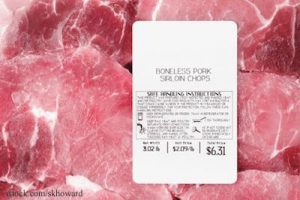This week, the World Trade Organization (WTO) is opening the COOL ruling appeal process to the public in an unprecedented move. Last year, the WTO ruled that the United States’ country-of-origin labeling (COOL) law in the 2008 Farm Bill is a barrier to free trade that violates agreements the U.S. has with several other countries.
 Country-of-origin labeling is simply identifying for the consumer where a product originated. WTO said that COOL is a “technical barrier to trade.” The Obama Administration is appealing this ruling.
Country-of-origin labeling is simply identifying for the consumer where a product originated. WTO said that COOL is a “technical barrier to trade.” The Obama Administration is appealing this ruling.
Consumer groups believe that consumers have a right to know where their food comes from. Food Poisoning Bulletin asked Chris Waldrop, Director of the Consumer Federation of America’s (CFA) Food Policy Institute, about this issue. In a statement, the CFA said that “U.S. consumers overwhelmingly support country of origin labeling.”
We asked why a simple label on a product is a technical barrier to trade. Mr. Waldrop said, “This came out of a complaint from Canada and Mexico; they complained that COOL does not benefit their products and may have been discriminatory. The WTO heard both sides and said the U.S. has the ability to label, but the way it was done was a barrier to trade. The language wasn’t specific enough.”
Polling on this issue shows strong consumer support. Mr. Waldrop said, “if people want to buy food from a particular company or avoid food from a certain producer, they should have that choice. This is an increasing trend. Consumers want to know where their food comes from, what’s in it, and how it’s produced.”
We asked who is charged with the job of educating consumers: producers, grocery stores, or the government? Waldrop answered, “all of the above. Sometimes the government needs to step in to make sure that information is standardized across the country and providing consumers with the same information. Companies could provide COOL information voluntarily, but that’s not enough. It’s important that the government set the standards for labeling.”
He continued, “for instance, nutrition facts panel on the back of packaged foods is not just a voluntary thing. It’s required across all packaged foods, so consumers can look at it, get information, compare that information across brands and food types, and make an informed decision.”




